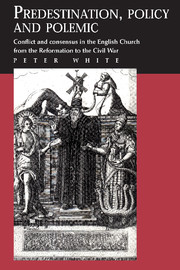 Predestination, Policy and Polemic
Predestination, Policy and Polemic Book contents
- Frontmatter
- Contents
- Preface
- Acknowledgements
- 1 The polemics of predestination: William Prynne and Peter Heylyn
- 2 The theology of predestination: Beza and Arminius
- 3 Early English Protestantism
- 4 The Elizabethan church settlement
- 5 Elizabeth's church: the limits of consensus
- 6 The Cambridge controversies of the 1590s
- 7 Richard Hooker
- 8 The early Jacobean church
- 9 The Synod of Dort
- 10 Policy and polemic, 1619–1623
- 11 A gag for the Gospel? Richard Montagu and Protestant orthodoxy
- 12 Arminianism and the court, 1625–1629
- 13 Thomas Jackson
- 14 Neile and Laud on predestination
- 15 The personal rule, 1629–1640
- Select bibliography
- Index
3 - Early English Protestantism
Published online by Cambridge University Press: 11 September 2009
- Frontmatter
- Contents
- Preface
- Acknowledgements
- 1 The polemics of predestination: William Prynne and Peter Heylyn
- 2 The theology of predestination: Beza and Arminius
- 3 Early English Protestantism
- 4 The Elizabethan church settlement
- 5 Elizabeth's church: the limits of consensus
- 6 The Cambridge controversies of the 1590s
- 7 Richard Hooker
- 8 The early Jacobean church
- 9 The Synod of Dort
- 10 Policy and polemic, 1619–1623
- 11 A gag for the Gospel? Richard Montagu and Protestant orthodoxy
- 12 Arminianism and the court, 1625–1629
- 13 Thomas Jackson
- 14 Neile and Laud on predestination
- 15 The personal rule, 1629–1640
- Select bibliography
- Index
Summary
Hooper and Latimer
Heylyn claimed that ‘Arminianism’ was nothing more than old English Protestantism revived. Just as, liturgically, Puritan objections to the 1559 Prayer Book were met by an increasing interest in that of 1549, so doctrinally the influence of Calvin and Beza was countered by an appeal to indigenous Henrician and Edwardian Protestantism. Given the strongly chauvinistic strain running through much English Calvinism, that argument had to be taken seriously. It was vital for each side to demonstrate that the foundation documents of the English Church, the formularies of belief, the Homilies, the Prayer Book, and the writings of those who had made the original break with Rome supported its understanding of the doctrinal stance of the English Reformation.
It would be naive to expect a reconsideration of the evidence to yield a conclusive verdict. Debates about grace and free will, justification and predestination are as old as Christian theology. As the Reformers soon discovered, the Fathers and the schoolmen provided them with endless material as they worked out the full implications of their protest against a theology of merit. They did not, it need hardly be said, speak with a unanimous voice. For this reason, and also because the primary concerns of that first phase of English Reformation theology were different from those of a century later, neither Prynne nor Heylyn found exactly what he wanted when they combed the works of the early English Reformers.
In spite of that, John Hooper was undoubtedly an embarrassment for Prynne, and a correspondingly valuable quarry for Heylyn.
- Type
- Chapter
- Information
- Predestination, Policy and PolemicConflict and Consensus in the English Church from the Reformation to the Civil War, pp. 39 - 59Publisher: Cambridge University PressPrint publication year: 1992
